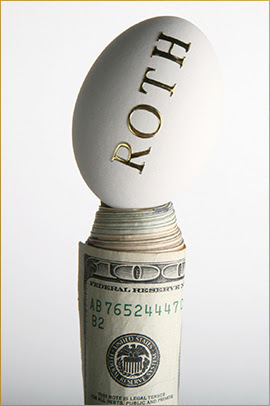Spring is in the air and it is a time when tax refunds start arriving. Outlined here are five smart uses for your refund. Given all the recent tax law changes, please review the tax planning article to ensure you take full advantage of them. Articles on managing student debt and a recap of Roth IRA's round out this month's
newsletter.
Should you know of someone who may benefit from this information please feel free to forward this
newsletter to them.
Five Smart Uses for Your Tax Refund
So you were fortunate enough to receive a tax refund this year. What are your plans for the money? Here are five ideas worth considering.
 | Pay down debt. Start with debts that carry the highest interest rates first, then move down the line. This is like savings on savings as you are freeing up future cash needed to pay the interest on this debt.
Ideas: Pay off credit card debt. Lower your student loan debt. Make a principal payment on a mortgage.
|
 | Add to savings. Save some of your refund for later use.
Ideas: Add to your emergency fund to have enough to cover at least six months of your every-day expenses. Add to a college savings account or a tax-advantaged retirement account.
|
|  |
 | Invest in yourself. Spend some money improving yourself or your well-being. Investing in yourself can have long-term benefits.
Ideas: Take a class to develop a hobby into a career. Consider a fitness membership. Take up meditation. Become accredited in your chosen profession.
|
 | Spend for permanence. Instead of spending your refund on day-to-day expenses, use some of it for capital purchases. Capital purchases are for items that last longer than one year.
Ideas: Replace a worn out couch. Purchase a replacement bicycle. Upgrade an outdated light fixture. Consider a minor home improvement.
|
 | Have some fun. Finally, consider using part of your refund for a well-deserved break. When balanced with using a portion of your refund to improve your financial condition, you can feel better about a little splurging in your life.
Ideas: Shop last minute flight deals for a weekend getaway. Take a road trip to a favorite destination.
|
|
|
Tax Planning Season is Now
Take multiple years of last minute tax law changes, add major sections of the tax code that expire each year only to be extended, and mix in major pre-formulated tax code changes. All this adds up to lots of potential for tax savings, but only if you plan accordingly. This is especially true in the following cases.
 | You have a child entering college. There are so many different college tax breaks, it is hard to determine which ones might make the most sense for your situation. This includes the American Opportunity Tax Credit, the Lifetime Learning Credit, Tuition and Fees Deduction, Coverdell Plans, 529 Plans, and student loan interest deductibility. |
 | You wish to explore charitable giving strategies. Consider donating appreciated stock instead of cash. If you are over the age of 70 consider donating directly from a qualified retirement account instead of using after-tax savings. |
| 
|
 | Review the now permanent tax provisions. Late 2015 legislation made many popular tax breaks permanent. Do you know what they are and how they may impact you this year? These include an educator $250 expense deduction, sales tax as an itemized deduction alternative, expanded American Opportunity Tax Credit, and an expanded Earned Income Tax Credit. |
 | Other changes may require a look. In addition to the tax provisions above, certain events may dictate a need for a quick tax review. Key among them are:
 | Getting married |
 | Recently divorced |
 | Birth or death in the family |
 | Age triggering events (like retirement) |
 | Kids entering or leaving school |
 | Moving to a new state |
 | Major purchase or sale of key assets including your home |
 | Large refund or tax bill last year |
|
|
Please call if you wish a review of your tax situation.
|
Small Business Tax Review May be in Order
|
|
Time to Consider a Roth?
With interest rates close to zero and a newly received refund check in hand, you may wish to consider a contribution to a Roth IRA.
The Roth IRA basics
Using after-tax funds, you can contribute up to $5,500 each year in a Roth IRA. If you are at least 50 years old, you can contribute an additional $1,000. As long as your Roth IRA has been open for 5 years or more and your withdrawal of earnings occurs after 59½ years old, any earnings you receive from this account are yours tax-free.
The benefits
|  |
| If you earn more than $132,000 (single) or $194,000 (married filing joint) you are not allowed to make a Roth Contribution in 2016. You can, however, convert funds from a traditional IRA without these income limitations. |
|
Ideas to Manage the Burden of Student Debt
Each year a new crop of graduating high school seniors begin their collegiate careers while college graduates consider the opportunities that graduate school provides. As a result, the mountain of student debt continues to build. While this debt is unavoidable, here are some ideas to help make that mountain a little less insurmountable.
|
|  |
 | Pay the interest. Some student loans accrue interest while you are in school. With the compounding of this interest, your student loan amount continues to grow with each passing year before repayment begins. Banks love this. You should not.
Suggestion: Figure out how to make the interest payments while in school. This will not only lock the amount you owe, it will reduce the amount of interest payments you will be paying on your interest.
|
 | Pay a little extra in the early days. The math of loans benefits banks in the early years of the note. This is because the vast majority of interest is paid by you in the first years of repayment. The last year of your loan repayment is primarily principal payments.
Suggestion: Pay extra every month as soon as payments start. While this seems impossible as you enter the workforce, even $10 extra a month can dramatically reduce the amount of total payments you make over the life of your loan.
|
 | Small savings yield big results. Having a hard time finding a few extra dollars to make extra payments? Consider observing and then changing your spending habits.
Suggestions: Purchase one less latte a week. Occasionally order water versus another beverage with a purchased meal. Drop one monthly service from a bill. Place these savings in an envelope and use them as a bonus payment on your student loan principal.
|
While student debt is an unavoidable outcome of getting a great education, it can be minimized if actively managed. Remember small changes can yield results if planned for in advance.
|
As always, should you have any questions or concerns regarding your situation please feel free to call.
|

















